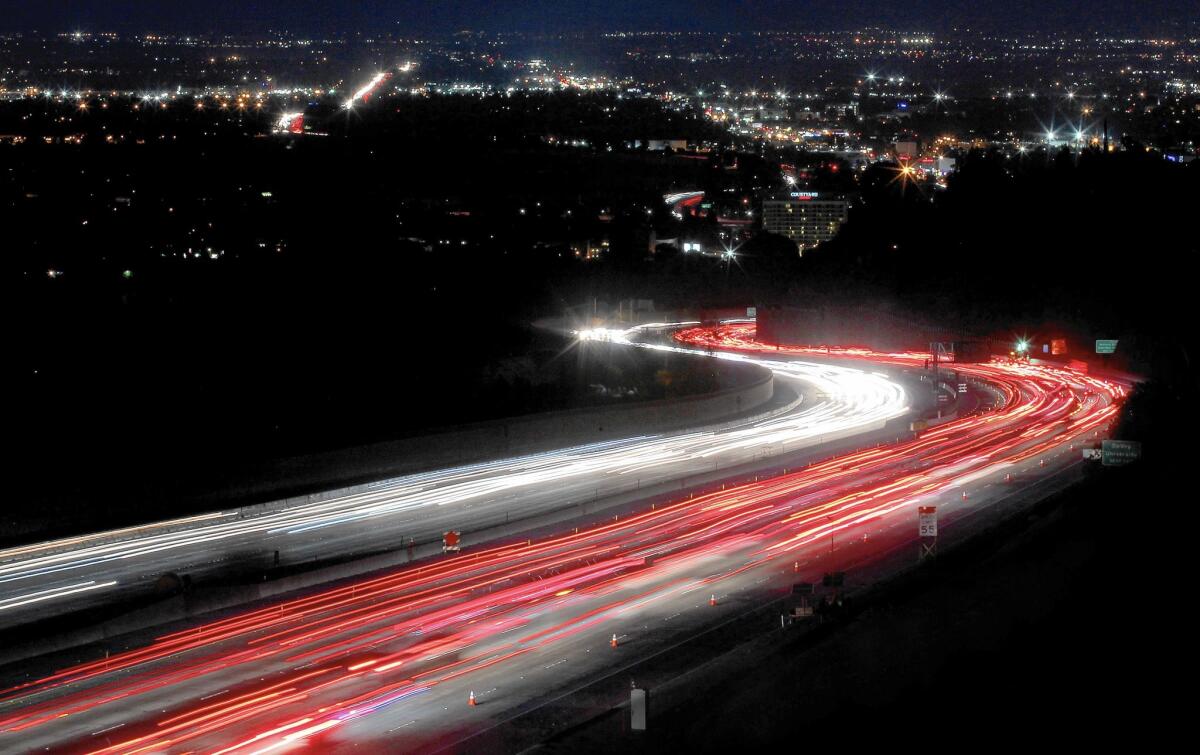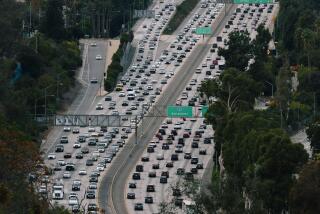California Commute: Stuck in bad traffic? Good chance it’s Thursday evening

- Share via
Crawling along Southern California’s freeways at rush hour, you might have wanted to scream: “This traffic is the worst!”
If it was a Thursday evening, you probably were right. At least, that’s the consensus of three companies that analyze traffic patterns using GPS technology.
All agree that Thursday evening is one of the slowest — if not the slowest — drive times of the week in greater Los Angeles. TomTom, the Dutch GPS company, estimates that during the Thursday after-work crunch, drivers in an area extending from Simi Valley to Costa Mesa spend 40 minutes of every hour sitting in traffic.
Ranking congestion and delays by day and time is complicated, and there’s some noise in the numbers. One firm says Friday afternoons are just as congested. Another says traffic on Wednesday is equally sluggish.
According to Inrix, a Washington-based technology company, the worst delays are between 5 and 6 p.m. on Thursday and Friday, when an average trip takes 47% longer than it would with no congestion. On Fridays, freeways begin backing up earlier, but Thursday’s congestion lasts longer, according to company spokesman Jim Bak.
That general pattern is the same in every major U.S. city, with the most severe traffic tie-ups coming near the end of the workweek, Bak said.
Inrix, TomTom and Waze, all firms that gather data from GPS-equipped vehicles or users of their traffic services, agree Tuesdays have the worst morning delays. On average, Tuesday trips at 9 a.m. in the Los Angeles area take about a third longer than they would if highways flowed freely, Inrix says.
Every route seems jammed during rush hour, but several stand out as consistently bad. At 50 minutes of delay, on average, the eastbound 10 is the most delayed route of any in the greater L.A. area, and the second-most congested in the United States, the company says.
Los Angeles takes the dubious honor of having five of the top 10 most congested freeway corridors in the country: the eastbound 10; the northbound 405; the southbound 5; the eastbound 91 ; and the northbound 101.
According to Inrix, the southbound 405 through the Sepulveda Pass is at its worst Wednesdays between 8 and 9 a.m., when congestion on average adds a half-hour to the commute. The longest delays northbound through the pass are Thursdays between 5 and 6 p.m., when congestion adds 40 minutes to the drive.
The worst time to drive between Santa Monica and downtown on the 10 Freeway is Thursday from 6 to 7 p.m. — in both directions, Inrix says.
The data-crunching averages, of course, don’t reflect the pantheon of problems on any given day that can clog up commutes: a crash, a brush fire, a couch falling off a truck.
And they don’t answer the question: Why Thursday?
“If people knew the answer to that one, we’d fix traffic,” said Kajon Cermack, 89.9 KCRW’s longtime traffic reporter.
Researchers have some theories. One is that commuters leave work early, and more in the heart of rush hour, near the end of the week, particularly on Thursdays. That’s partly because some Los Angeles-area commuters who work flexible schedules, either taking Friday off or working from home, are getting a jump on their long weekends. Also, college students often commute to evening classes on Tuesdays and Thursdays.
And there’s just more going on around town on Thursday and Friday nights.
“If you think about Los Angeles, and the surrounding area, you have a lot of destinations,” said Bill Eisele, a senior research engineer at the Texas A&M Transportation Institute. “There’s always something going on somewhere in the basin, not only for locals, but for people who are visiting.”
Peter Kallman, 28, of Mar Vista gets that. “People come visit and they’re like, ‘What are we doing tonight?’ And I’m like, ‘I don’t care, as long as it’s close by,’” he said. “If we drive anywhere on Thursday or Friday, we end up sitting in the car for two hours.”
Ultimately, Cermak said, avoiding L.A. traffic comes down to individual drivers taking responsibility for congestion — and adjusting travel plans or the modes of transportation they use.
“It’s so easy to think, ‘All those other cars are making my drive worse,’” Cermak said. “But you are a part of traffic. You are the traffic.”
California Commute columnists Laura J. Nelson and Dan Weikel are looking for leads. Send them ideas, gripes and questions.
For more transportation news, follow @laura_nelson on Twitter.
More to Read
Sign up for Essential California
The most important California stories and recommendations in your inbox every morning.
You may occasionally receive promotional content from the Los Angeles Times.











